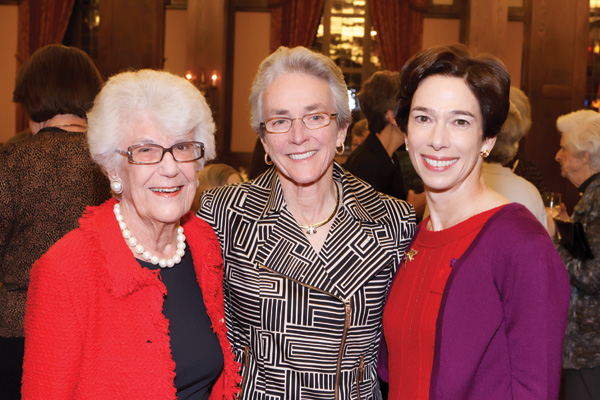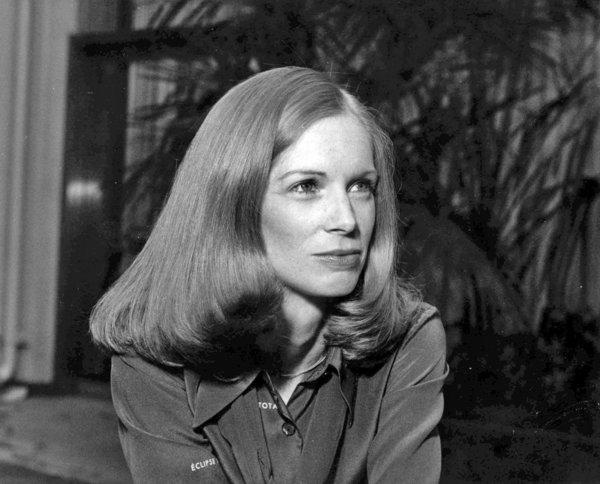In the Spring/Summer 2013 articleLetters
Remembering the “Lioness”

Mary Lee Lowe Dayton, my friend in Minnesota and my classmate at Vassar in the Class of 1946, died this past August and her extraordinary gifts to the college deserve the knowledge and the gratitude of all of us.
In 2004, Mary Lee brought much-needed air conditioning to Alumnae House (where, incidentally, she and I and 28 others lived a cozy freshman year after Vassar discovered it had more incoming students than campus beds). In 2006, Mary Lee also renovated Vassar’s Wimpfheimer Nursery School, where she had spent much time as a child study major.
After graduation, Mary Lee returned to Minnesota, taught kindergarten at her alma mater, Northrop School, and married Wallace Dayton, whose family, for many years, has owned the Dayton Corporation, now known as Target, and Mary Lee’s devotion to Vassar simply spread to their family. Mary Lee herself served twice as a trustee, and the eldest of her four daughters, Sally Dayton Clement, who graduated from Vassar in 1971, has just completed an unusual 12 years as a trustee. Sally’s son, Winston Clement, graduated from Vassar in 2009, as did another of Mary Lee’s grandchildren, Katherine Sturgis, in 2003.
Vassar was only one of many institutions Mary Lee supported. She worked tirelessly for the YWCA of Minneapolis, Macalester College, Planned Parenthood, and many others—so many others, in fact, that her obituary in Minneapolis’ Star Tribune dubbed her “a civic lioness.”
Vassar College is simply very, very lucky to have been one of her most cherished cubs.
Shatterer of Glass Ceilings

The Class of 1966 has lost dear and cherished friends over the decades, but for many of us, the death of Elisabeth “Lala” Coleman this past June has been unexpectedly devastating.
We were all proud of her for helping break through sexual discrimination at Newsweek, where a Vassar College degree might get you a job as a “researcher” for $85.00 a week. Riding that victory to a reporting job for Newsweek in San Francisco, where, among other assignments, she covered the trial of activist Angela Davis, Lala moved ever onward: a reporter for KQED-TV, then ABC, and, I guess, once he got his eyes on her, press secretary to Governor Jerry Brown. Back in New York, she started her own communications company and moved from there to director of public relations for Ernst & Young, before she found her professional niche in the American Express Travel Division and, later, as VP of international public affairs and communications.
I have no idea how many other talented women pursued fulfilling careers once the Newsweek suit shone a harsh light on sexual discrimination. I do know it took courage, and perseverance, for a young woman with Lala’s brains and beauty to chart such an impressive course for herself over the years.
We love her, and we will miss her.
Meating Resistance
Editor’s note: We received several letters from readers troubled that the vegetarian or vegan perspective was not included in our lineup of stories for the “EAT” issue [Spring-Summer 2013]. We urge readers to check out the winter issue, which will contain a follow-up that presents alumnae/i and student advocates for veganism, vegetarianism, and animal welfare.
I was thrilled to see a Quarterly issue dedicated entirely to food; however, I was disappointed that not a single vegetarian or vegan perspective was included.
Having spent time at Catskill and Woodstock farm animal sanctuaries, I’ve learned the only difference between animals we call “pets” and those considered “food” is our treatment of them. Farmed animals are intelligent and sensitive individuals who can suffer from pain and experience joy and happiness, like the cats and dogs many of us know and love.
However, if meat producers confined, mutilated, or slaughtered a single cat or dog the way they treat billions of farmed animals, they could be arrested and jailed on grounds of animal cruelty.
Vassar has a history of compassion for animals, producing activists who have worked for prominent animal advocacy organizations including Mercy For Animals and the Humane Society of the United States. Students with the Vassar Animal Rights Coalition organize successful pro-vegetarian campaigns such as Meatless Monday, with nearly 25 percent student participation.
As people learn about the horrors of factory farming, vegetarian and vegan eating is on the rise nationwide—especially among college campuses. Vassar continues to lead by creating a more compassionate and humane world for all and I hope to see these efforts more accurately reflected in our literature.
Although the Spring/Summer 2013 Quarterly’s focus on food issues was very informative, I was very disappointed that not one of the dozens of articles was about vegetarianism. Given the current state of the environment, it is essential that humans eat fewer animal products. No matter how sustainably animals may be raised, the fact is that animal agriculture utilizes many natural resources, including land, water, and all the energy that is required to raise and transport feed. In fact, approximately 70 percent of the grain grown in this country goes to feed animals instead of humans.
Eating vegetarian or vegan food encompasses many issues: conservation of natural resources, world hunger, animal rights, and human health. I myself have been vegan for the past 20 years, and am in excellent health. There must be other Vassar alums who are vegetarian or vegan.
As a current Vassar student devoted to advocating on behalf of farmed animals and the environment, two voiceless entities exploited by animal agriculture, I’m deeply troubled by the Spring/Summer 2013 issue of the Vassar Quarterly. While I can appreciate the issue’s focus on individuals seeking to protect certain species of animals (“heritage breeds”) and to minimize energy use (cooking in a LEED-certified kitchen), I must inquire as to why VQ did not even make mention of a vegan perspective—the only manner, in my opinion, by which to truly protect animals and curtail one’s carbon footprint. Indeed, the UN recently named all forms of animal agriculture, including small-scale “grass-fed” farms, “one of the top two or three most significant contributors to the most serious environmental problems at every scale from global to local.” When one considers how much land it requires to raise a single grass-fed cow, this fact doesn’t seem all too surprising.
I urge those involved in the production of the latest issue of VQ to consider the harm and, frankly, offensiveness of the messages contained within it.
Foodie Recognition
The most recent Vassar Quarterly was far and away the best issue I’ve read since my graduation—from the bold cover design to the nostalgic aromas of the all-night bakery (I remember the “old” guy with his ever-present stogie hanging between his lips with the ash we thought was regularly mixed in the dough). Should I say I devoured the articles? OK, I said it. No kidding, a great job.
John Marks ’74
Phoenix, Arizona
I enjoyed reading the Vassar Quarterly’s timely feature on food (“Eat”). Among the persons featured, however, I was disappointed not to find another Vassar alumna who has, for many years, contributed innovatively to good and healthy eating. Patricia Kersten Brooks ’47 has been the New York Times Connecticut food reviewer since 1977. Pat began her career with The Presidents’ Cookbook, co-authored with Poppy Cannon, also a Vassar graduate. In the 1960s heyday of commuting spouses, Pat wrote Meals That Can Wait—recipes for delicious dishes that would hold up if long hours in the office or late trains delayed the commuter beyond the family dinner hour. Just off the press is Pat’s Food Lovers’ Guide to Connecticut—not just a guide to restaurants but to farmers’ markets, farm stands, locally grown or produced foods, “food happenings” such as Annual Tastes in various towns, and learning to cook. A frequent contributor to Travel + Leisure and Bon Appétit, Pat was ahead of the curve with her knowledge of ethnic cuisines that drew on wide travel and residence in Asia soon after her Vassar graduation.
The Scope of “Learning”
I was heartened by Joan Zimmerman Shore’s ’56 courageous letter in the Vassar Quarterly [Winter 2013]. She told of her dismay about how special interests (LGBTQ) have splintered the “esprit de corps” that had once prevailed at Vassar and the other Seven Sisters schools.
When I recently stumbled upon the Vassar Chronicle for October 1957 online, I was reminded that the underlying emphasis back then was to learn to think critically, and to acquire knowledge by studying the best that Western civilization had produced. We were raising our sights by focusing on the products of great minds. That pursuit of academic excellence took place within an atmosphere relatively free from diversionary social and political issues. (Oh yes, there were a few ripples, like when we marched by candlelight to protest the occupation of Hungary.) The openness of inquiry that was encouraged back then seems to me in marked contrast to the conformity governing the passé (harking back to the 1960s!). Politically correct studies and majors, and other social activist issues that foment “victim status” attitudes, clog the minds of students and shatter freedom of thought on campus. The climate on campus appears to be supported by the administration and the current curricula.
Those four short years in college are precious. Isn’t it best to dedicate them to acquiring a basic liberal arts education? Isn’t there time enough for pursuing social agendas and special political interests during the long years following graduation?
